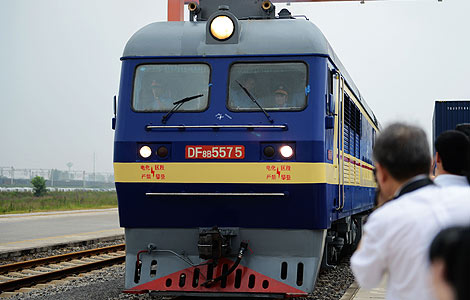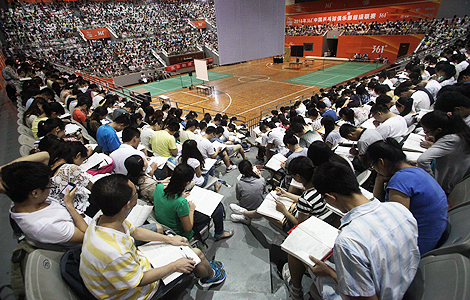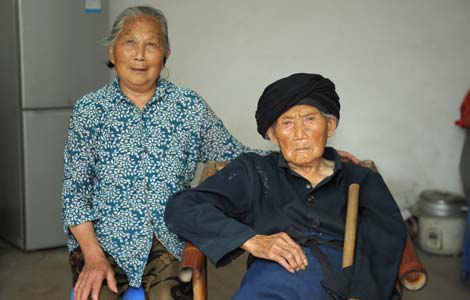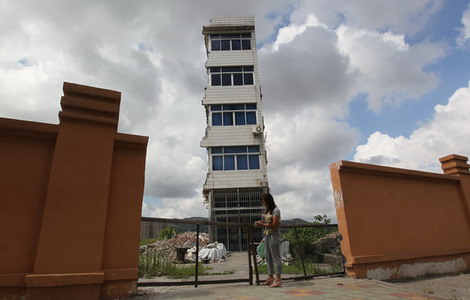

 |
|
Qin Chang (left), a host at Shanghai Radio, gives a lecture to officials from Guangzhou tax bureau, teaching them how to deal with interviews. [Photo/China Daily] |
Reports of success
CELAP hosts a training innovation and case study center. It also has seven highly accomplished professors who travel the country to collect cases of government disputes or problems. They then add notes about the disputes to the center's databases.
The task of teaching officials, Li said, is not an easy one. She said that at first she felt nervous when she came face-to-face with high-ranking officials. Carrying on the discussion-oriented class at the right pace requires much thought and homework, she explained. She and other professors had to study the names of officials and decide how to divide them into groups to induce the most efficient discussions.
"We would put people with similar job functions into the same group, so that each group could hear different sides of a story during the discussion. That helps them to think from another angle," she said.
Professors also had to make people comfortable in commenting on each other's ideas, especially in front of direct bosses.

But the best part of the job, Li said, was when her students called and told her an emergency incident was solved after they got back to work.
Feng said the academy believes that the training should help officials fulfill their daily work needs. Crisis management courses, he said, are vital.
"China is transforming. We have pulled through a 200-year history of the Western world in just 30 years. It means we have to solve all kinds of social problems within such a short period. It's huge pressure. Improper handling could lead to social breakouts," he said.
The crisis management course at CELAP is gaining popularity at other schools.
Li Xuefeng, professor at the National Institute of Emergency Management, which is associated with the Chinese Academy of Governance in Beijing, said his institute is expanding from offering two courses on crisis management to seven this year. He said that before the institute was founded in 2010, trial crisis management courses had appeared in the academy's normal cadre training programs. "(It was) not long after the 2003 SARS cover-up," he said.
Changing 'old thoughts'
"Besides crisis management class, another aspect that's never too much for the students," added Li, "is learning how to communicate with the media."
Feng at CELAP agrees. His academy was the first in the country to open media communication courses. In 2005, CELAP built the first media simulation laboratory, which has since been recognized as an effective training ground for officials. CELAP's lab was divided into two parts: one simulating an exclusive interview room and another simulating a press conference room.
Qin Chang, a host at Shanghai Radio, was recently an invited lecturer for the CELAP lab. She taught the interview sessions. In a December class, her students were officials from a tax bureau in Guangzhou.
"I know you guys, as the tax people, do not face the media very much. But I am letting you know that you won't be hiding from that for long," Qin said at the start of that lecture.
During the class, she quizzed them with a hypothetical question: "Why are taxes so heavy?" Many of the interviewees failed to answer most of Qin's fierce follow-up questions.
"I was being tougher than normal. But the idea I hope to pass along is that you have to understand the party you're talking with well enough to achieve effective communication," she told the students.
She also said that when communicating with the public, simply considering how to keep one's position safe is not the reaction teachers are looking for.
"As we enter the Internet era, one can't assume that others will never know things he or she doesn't say, or they will never question what one says. In today's media environment, officials have to change some old thoughts," she said.
Feng said communicating with the media is a basic necessity for officials. "The media are a very important bridge. How could one really understand the public without deeply knowing the media?"
Courses on media communication can now be found in various training institutes, including both the Chinese Academy of Governance and the Party School of the Central Committee of CPC.
Keeping current
Cadre training dates to the founding of the CPC. The oldest training institution, the Central Party School of the CPC, has a history of more than 70 years.
In the mid-1990s, the Chinese Academy of Governance was established. In 2005, three leadership academies were founded in Shanghai, Jinggangshan and Yan'an. Different training institutes were also started on the provincial and city levels.
The country put the Emergency Response Law into effect in November 2007, stipulating regular training for officials in charge of emergency management. In the following years, crisis management has been compulsory in the academy's regular training programs.
"The key is to keep the content up to date," said Zhang Tingyin, an economics professor with the Party School of the Henan Committee of the CPC who has been teaching there for more than 20 years, "When planning a new semester, we follow the direction that things we teach in class have something to do with the latest policies."
In recent years, the country's cadre training system has been striving to be more open to the public. Just ahead of the 89th anniversary of the founding of the CPC last year, the Central Party School opened its doors to more than 60 reporters, including 42 from 24 overseas media organizations. In the ensuing months, several local Party schools held open media sessions.
Both Feng and Li Xuefeng said their institutes are looking to teach officials how to communicate internationally through exchange programs and by inviting foreign lecturers.
Feng said CELAP has now trained 1,600 people from 60 countries, including Australia, Canada and Russia as well as countries from the European Union. Most of the trainees are high-ranking government officials and senior managers at businesses.
"About 12 percent of our current lecturers are from foreign countries," he said. Foreign lecturers are usually invited for topics such as economic management, public administration, environment and ecology.
"People's mindsets have changed with the time, and old administrative practices no longer fit," Feng said. "Our goal is that what is taught here can turn into actions when one goes back."
Jiang Xueqing, Li Tao and Zhao Yanrong contributed to this report.







